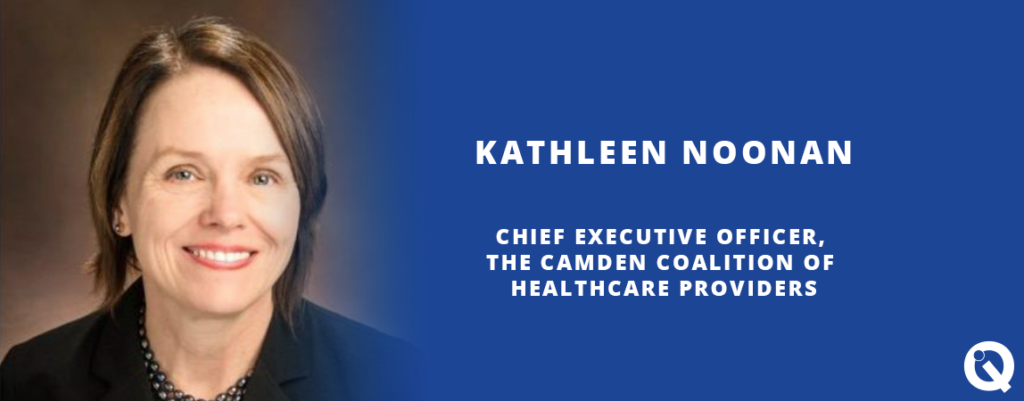As the CEO of the Camden Coalition of Healthcare Providers, Kathleen Noonan speaks with us about their recently published findings from their randomized controlled trial (RTC) in 2014.
Why did the Camden Coalition undertake the randomized controlled trial (RTC) in 2014?
It was a great opportunity for us — a relatively small nonprofit — to work with an academic research partner to test our intervention in a community-based setting. Having spent many years as the co-director of PolicyLab, a research center at the Children’s Hospital of Philadelphia, I have a deep appreciation for the strengths that come with a research partnership group like J-PAL North America. Plus, in 2014, funding was available from the Centers for Medicare and Medicaid Innovation Center to study our intervention. Our hypothesis was that targeted short-term care management and care coordination could support medically complex patients and reduce overall costs and improve care for this population. The metric studied was hospital readmission.
What did the RTC find?
The study looked at the 400 intervention patients and the 400 in the control group. It found that if you looked at both groups from the time of initial discharge and followed them for 180 days, there was the same rate of hospitalization for both groups. I think it’s important to also highlight that there was a statistically significant difference in the intervention group being connected to SNAP benefits (food stamps) versus the control.
What do you think the result means?
That the impact of health systems is important, but insufficient for certain patients. Given the landscape and complexity of the patients we intervened with, a 90-day intervention was insufficient – even in Camden, where we had a whole community that was really organized around elevating the standard of care. Health care interventions aren’t enough to tackle the social issues that show up every day in clinics. Obviously there’s a tremendous role that health care systems can play in healing patients, but it’s really about a broader ecosystem. It’s about actionable policies that meaningfully address social determinants of health, such as homelessness, food insecurity, and poverty.
So, what do the results of the RTC not mean?
We don’t view the results to mean we didn’t have an impact, as we know that our clients benefited from the intervention. We see the results as indicating that for this very complex population of patients, the most complex population that has been studied using this type of care management intervention, the 90-day intervention did not affect this single metric. We don’t think it means we should give up on care management programs because they have been successful in reducing readmissions in other, less complex populations. And we don’t think it means that we should give up on care management for people with complex health and social needs; rather, we need to learn more about how to best serve them. Finally, we certainly don’t think it means that health care should disinvest or ignore social determinants of health.
What are the next steps?
We are incredibly lucky to work with such strong hospital and community partners in South Jersey. The amount of attention this study has received underscores a number of things, including how few community-based organizations have the support, capacity, and opportunity to participate in rigorous evaluations. We’ve shown that you can actually do these important studies in a way that leaves a community-based organization stronger in its data analysis capacities, and be able to use the information to adapt and adjust its interventions along the way.
While the RCT was in place, we started a Housing First program and supported a community-wide campaign called the “7 Day Pledge,” a collaborative approach to insuring primary care follow up appointments within seven days of hospital discharge for Medicaid patients. After the study ended, we launched a Medical-Legal Partnership with Rutgers Law School. We’ve also advocated and supported the expansion of things like MAT in Camden. We’re also specifically working in partnership with J-PAL North America and the Rutgers Center for State Health Policy to look at the data and to figure out what else we can learn from the study and what else will be useful for the entire field.

